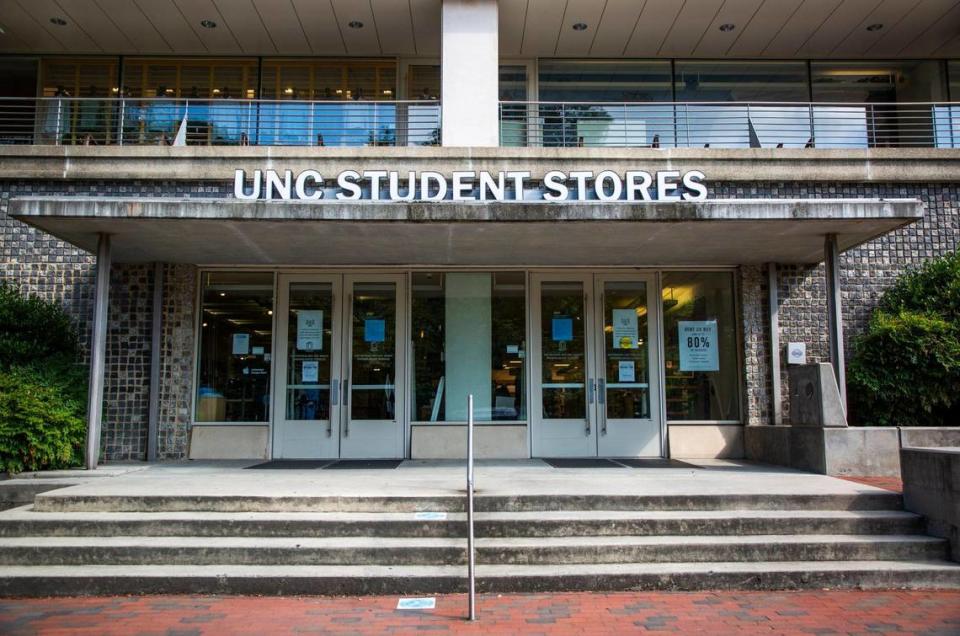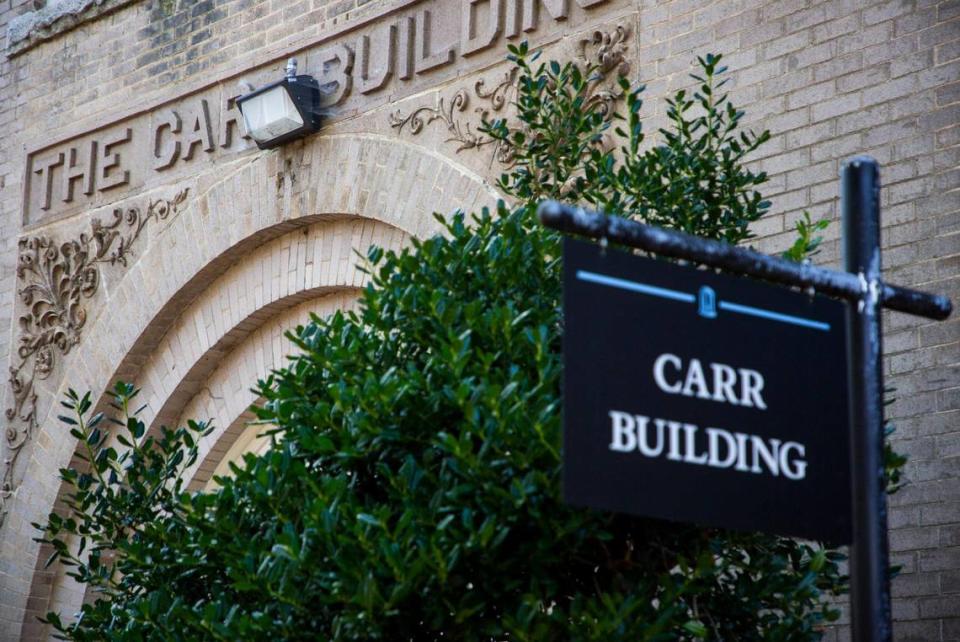UNC-Chapel Hill seeking final submissions to rename campus buildings with racist ties
- Oops!Something went wrong.Please try again later.
UNC-Chapel Hill is getting closer to renaming three campus buildings that were named for individuals with ties to white supremacy and racism.
The Chancellor’s Advisory Committee on Naming University Facilities and Units met Thursday to discuss potential names that will be sent to the chancellor and then to the UNC-CH Board of Trustees for approval.
In March, Chancellor Kevin Guskiewicz asked the community to submit ideas to rename Aycock Residence Hall, the Daniels Building and the Carr Building. The deadline for people to make online submissions is Friday at 5 p.m.
The board voted to remove the names of Charles B. Aycock, Julian S. Carr and Josephus Daniels from their respective buildings last summer. The decision came after mounting pressure and protests from students, faculty and alumni and as the Black Lives Matter movement put a new national spotlight on removing Confederate monuments and building names tied to racism.
These men “occupied high positions of influence and public trust” and used that power against Black people, according to the university’s Commission on History, Race & A Way Forward, which asked for the name changes.
Guskiewicz has said he’s grateful to the students, faculty and staff who have advocated for these changes, and he expects the buildings to be renamed before the fall semester.
The university said there is a “high bar” for a name to be considered as a building name. That includes a commitment to teaching, research and public service; have been underrepresented; and have a “demonstrated positive impact” on the campus and community.
Nearly 30 names on the Honorific Naming Registry have been submitted so far. The naming committee will narrow down the list to six nominations. The chancellor will then consider those names to recommend to the Board of Trustees.
The following names, and their accomplishments, are among those being considered.
Johnston Blakely, an Army captain, was the first UNC-CH alumnus to diein military service to the United States.
John L. Brandon was among the first undergraduate students to integrate UNC-Chapel Hill.
W. Horace Carter was the editor of The Tar Heel student newspaper and later campaigned against the Ku Klux Klan and won a Pulitzer Prize for public service.
Lenoir Chambers was one of the first three Carolina alumni, along with Horace Carter and Vermont Royster, to receive the Pulitzer Prize for journalism.
Julius Chambers was the successful civil rights lawyer and Director-Counsel of the NAACP Legal Defense and Educational Fund Inc. He graduated from UNC Law School and served as chancellor of NC Central University for 18 years.
Genevieve Lowry Cole was a member of the Lumbee tribe and the first female American Indian student to graduate from UNC.
Dr. Anna Julia Cooper was born into slavery in Raleigh went on to become the second Black woman in the U.S. to earn a master’s degree and the fourth African American woman to earn a doctoral degree.
William Alexander Darity Sr. was the first Black student to earn a doctorate from UNC and was a member of the Board of Trustees.
Irene Dillard Elliott was among the first women to earn doctorate degrees at UNC and was the first woman to earn a full professorship and deanship at the University of South Carolina.
Richard J. Epps Jr. was the first Black student elected student body president at UNC-CH.
Ralph K. Frasier was among the first undergraduate students to integrate UNC-Chapel Hill.
LeRoy B. Frasier Jr., Ralph’s brother, was among the first undergraduate students to integrate UNC-Chapel Hill.
Santiago Gangotena earned his doctorate in physics from UNC in 1977 and later founded the Universidad San Francisco de Quito (USFQ), the first private, liberal arts University in Ecuador.
Patricia Dallas Horoho graduated from the UNC nursing program and became the 43rd Surgeon General of the U.S. Army, the first nurse and first woman to hold the position.
Zora Neale Hurston was an American author, folklorist and anthropologist whose work often depicted African American life in the South.
Anna Forbes Liddell was among the first women to earn doctorate degrees at UNC and was active in the suffrage movement in North Carolina.
Hortense K. McClinton was the first Black professor hired at UNC-CH. She created and taught a course on institutional racism in the School of Social Work.
Rev. Dr. Pauli Murray was the first Black person to earn a JSD (Doctor of the Science of Law) degree from Yale Law School. Murray also was a founder of the National Organization for Women and the first Black woman to be ordained an Episcopal priest. Her work was critical for public school desegregation, women’s rights in the workplace and LGBTQ+ rights.
Henry Owl was a Cherokee from the Qualla Boundary and the first American Indian admitted to UNC. He helped secure U.S. citizenship for the people of the Eastern Band of Cherokee Indians.
Karen L. Parker was the first Black woman undergraduate at UNC and chronicled her years as a student during the civil rights movement.
Vermont C. Royster was a former editor of The Daily Tar Heel, a two-time Pulitzer Prize winner in journalism and former professor at UNC-CH.
Charles T. Scott was UNC’s first Black scholarship athlete for men’s basketball coach Dean Smith. His recruitment was considered a turning point in race relations in North Carolina.
Karen Leslie Stevenson was the first Black woman awarded the Morehead Scholarship at UNC-CH, a student-athlete and the first Black woman in the country selected as a Rhodes Scholar.
Sallie Walker Stockard was the first woman to graduate from UNC, earning her bachelor’s degree in 1898 and a master’s degree in 1900.
Patricia Wallace was the first woman elected student body president at UNC-CH and became a First Amendment attorney, defending the right of free speech.
Land Acknowledgment Hall - Land acknowledgments honor a place’s Indigenous people and recognize their history.
Integrity Hall



